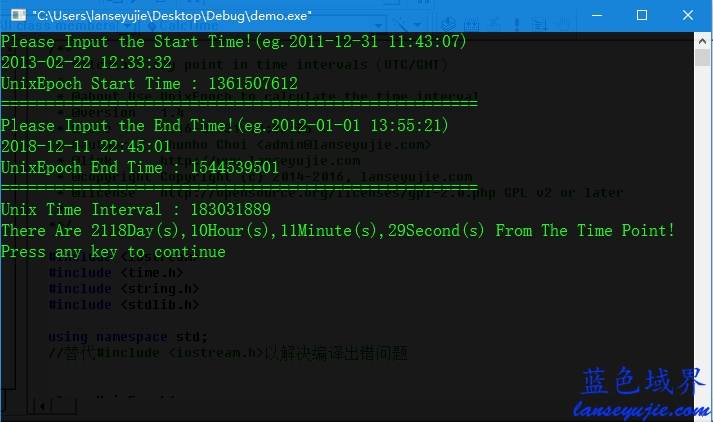本文最后由 森林生灵 于 2017/03/10 18:16:37 编辑
上节课老师留了一个问题,设计程序计算任意时间点间隔时间,想到每一年的月份天数不一样需要好多判断,感觉好复杂。但联想到前段时间写PHP时的时间处理用到了Unix时间戳,顿时来了灵感,利用Unix时间戳每一秒+1的特性,利用两个时间点的Unix时间戳的差来计算天数岂不是简单的多,而且可以精确到秒。

/**
* Calculate any point in time intervals(UTC/GMT)
*
* @about Use UnixEpoch to calculate the time interval
* @version 1.4(Visual C++ 6.0)
* @date 2016-03-31 13:38:56
* @author 森林生灵 <admin@lanseyujie.com>
* @link https://www.lanseyujie.com
* @copyright Copyright(c) 2014-2018, lanseyujie.com
* @license http://opensource.org/licenses/gpl-2.0.php GPL v2 or later
*/
#include <iostream>
#include <time.h>
#include <string.h>
#include <stdlib.h>
using namespace std;
class UnixEpoch
{
private:
int iY, iM, iD, iH, iMin, iS;
public:
long GetTick(char *str_time);
void CalcTime();
};
//标准时间转换Unix时间戳
/*说明:Unix时间戳的0按照ISO 8601规范为:1970-01-01T00:00:00Z,即起始
时间只能从1970年1月1日0时0分0秒(UTC协调世界时/GMT格林尼治标准时间)
开始计算经过的秒数,不考虑闰秒。目前大多数的Unix系统中Unix时间戳存储
为32位,2038年会引发Y2038问题(千年虫危机)*/
long UnixEpoch::GetTick(char *str_time)
{
struct tm stm;
memset(&stm, 0, sizeof(stm));
iY = atoi(str_time);
iM = atoi(str_time + 5);
iD = atoi(str_time + 8);
iH = atoi(str_time + 11);
iMin = atoi(str_time + 14);
iS = atoi(str_time + 17);
stm.tm_year = iY - 1900;
stm.tm_mon = iM - 1;
stm.tm_mday = iD;
stm.tm_hour = iH;
stm.tm_min = iMin;
stm.tm_sec = iS;
return mktime(&stm);
}
//处理时间数据
void UnixEpoch::CalcTime()
{
char str_time[19];
long tm_start,interval_day, interval_hour, interval_minute, interval_second;
cout << "Please Input the Start Time!(eg.2011-12-31 11:43:07)" << endl;
gets(str_time);
//获取起始时间
cout << "UnixEpoch Start Time : " << GetTick(str_time) << endl;
cout << "=====================================================" << endl;
tm_start = GetTick(str_time) ;
cout << "Please Input the End Time!(eg.2012-01-01 13:55:21)" << endl;
gets(str_time);
//获取截止时间
cout << "UnixEpoch End Time : " << GetTick(str_time) << endl;
cout << "=====================================================" << endl;
interval_day = GetTick(str_time) - tm_start;
//计算时间间隔的秒数
cout << "Unix Time Interval : " << interval_day << endl;
interval_second = (((interval_day % 86400) % 3600) % 60) / 1;
//计算间隔时间余秒数
interval_minute = ((interval_day % 86400) % 3600) / 60;
//计算间隔时间余分钟数
interval_hour = (interval_day % 86400) / 3600;
//计算间隔时间余小时数
interval_day /= 86400;
//计算间隔时间天数86400s = 24h * 60m * 60s = 1Day
//倒序计算天/时分/秒是为了防止interval_day执行/=时被重新赋值
cout << "There Are " << interval_day << "Day(s)," << interval_hour << "Hour(s)," << interval_minute << "Minute(s)," << interval_second << "Second(s)" << " From The Time Point!" << endl;
}
int main()
{
system("color 0a");
UnixEpoch demo;
demo.CalcTime();
//system("pause");
return 0;
}/**
* Calculate any point in time intervals(UTC/GMT)
*
* @about Use UnixEpoch to calculate the time interval
* @version 1.2(GNU GCC Compiler 6.2.0)
* @date 2017-03-10 18:07:59
* @author 森林生灵 <admin@lanseyujie.com>
* @link https://www.lanseyujie.com
* @copyright Copyright(c) 2014-2018, lanseyujie.com
* @license http://opensource.org/licenses/gpl-2.0.php GPL v2 or later
*/
#include <iostream>
#include <sys/time.h>
#include <stdio.h>
#include <string>
#include <cstring>
#include <stdlib.h>
using namespace std;
class UnixEpoch
{
private:
int iY, iM, iD, iH, iMin, iS;
public:
long GetTick(char *str_time);
void CalcTime();
};
long UnixEpoch::GetTick(char *str_time)
{
struct tm stm;
memset(&stm, 0, sizeof(stm));
iY = atoi(str_time);
iM = atoi(str_time + 5);
iD = atoi(str_time + 8);
iH = atoi(str_time + 11);
iMin = atoi(str_time + 14);
iS = atoi(str_time + 17);
stm.tm_year = iY - 1900;
stm.tm_mon = iM - 1;
stm.tm_mday = iD;
stm.tm_hour = iH;
stm.tm_min = iMin;
stm.tm_sec = iS;
return mktime(&stm);
}
void UnixEpoch::CalcTime()
{
char str_time[19];
long tm_start, tm_end, interval_day, interval_hour, interval_minute, interval_second;
cout << "Please Input the Start Time (e.g.2011-12-31 11:43:05)!" << endl;
cin.getline(str_time, 20, '\n');
tm_start = GetTick(str_time);
cout << "UnixEpoch Start Time:" << tm_start << endl;
cout << "====================================================" << endl;
cout << "Please Input the End Time (e.g.2014-10-02 09:37:35)!" << endl;
cin.getline(str_time, 20, '\n');
tm_end = GetTick(str_time);
cout << "UnixEpoch End Time:" << tm_end << endl;
cout << "====================================================" << endl;
interval_day = tm_end - tm_start;
interval_second = (((interval_day % 86400) % 3600) % 60) / 1;
interval_minute = ((interval_day % 86400) % 3600) / 60;
interval_hour = (interval_day % 86400) / 3600;
interval_day /= 86400;
cout << "There Are " << interval_day << "Day(s)," << interval_hour << "Hour(s)," << interval_minute << "Minute(s)," << interval_second << "Second(s)" << " From The Time Point!" << endl;
}
int main()
{
UnixEpoch demo;
demo.CalcTime();
return 0;
} 本文标题:C++利用Unix时间戳计算任意时间点时间间隔
版权声明:本文使用「署名 4.0 国际」创作共享协议,转载或使用请遵守署名协议。
相关文章
上一篇:最后的告别

